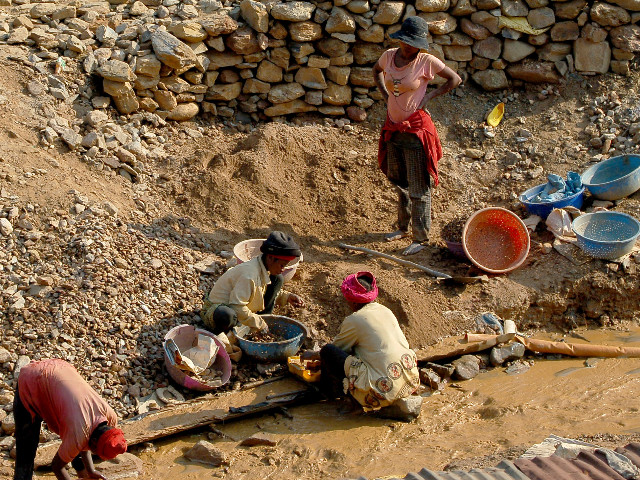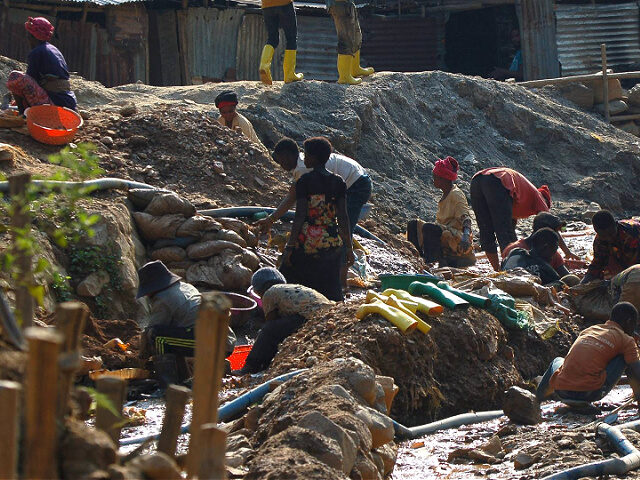Rural communities in the Democratic Republic of Congo (DRC) are facing an “environmental catastrophe” as mining for cobalt and other minerals necessary for manufacturing batteries poisons their land and water with toxic chemicals, experts told Congress on Tuesday.
The DRC’s cobalt mining industry is dominated by Chinese companies, which purchase the raw ore and process it, then use it to manufacture lithium-ion batteries, common in mobile phones and other electronics as well as electric vehicle (EV) batteries. Supporters of an energy “transition” away from fossil fuels such as coal and crude oil tout these technologies, particularly EVs, as the key to lowering the world’s carbon emissions and limiting the alleged negative effects of climate change. Yet the facts on the ground in DRC suggest that obtaining the raw materials for this technology is toxifying farmlands and water supplies, endangering and ultimately shortening the lives of a significant percentage of Congolese people.
The mines are often local operations in which impoverished residents — including “children as young as three,” the experts noted — handle toxic minerals with no protective gear and work in extremely dangerous conditions. Tens of thousands of children are believed to be enslaved in cobalt and copper mining.
The experts addressing Congress did so during a hearing on Tuesday held by the Congressional-Executive Commission on China (CECC), a body made up of senators and representatives that, among other tasks, studies the Chinese Communist Party’s noxious influence around the world.
As the chair of the CECC, Rep. Chris Smith (R-NJ) noted the observations of those testifying during the hearing would inform the process around passing a bill currently known as the China’s Odious and Brutally Atrocious Labor Trafficking Supply Chain Act, or “COBALT Supply Chain Act.” If turned into law, the bill would effectively ban the importation of “goods, wares, articles, or merchandise containing metals or minerals, in particular cobalt and lithium and their derivatives, mined, produced, smelted or processed, wholly or in part, by child labor or forced labor in the DRC.” Anyone attempting to import such items would have to present evidence convincingly showing that their imports were not tainted with child labor or slavery.
The bill follows the format adopted by the Uyghur Forced Labor Prevention Act (UFLPA), a law that went into effect in 2022 and bans the importing of slave cotton from occupied East Turkistan, where China is currently engaging in a genocide of the indigenous Uyghur people and other non-Han groups. Those seeking to import items from East Turkistan must prove the supply chain does not include products tainted by slavery.
Rep. Smith, noting China’s “almost full dominance of every single step of the cobalt supply chain,” highlighted the “disastrous environmental impacts of cobalt mining” in DRC.
“The very air they breathe and the water they drink are contaminated by toxic chemicals, dirt, and sediment,” he observed. “From dirt to battery, from cobalt to cars, the entire system is fueled by violence, cruelty, and corruption.”
Stavros Niarchos, a journalist who has been imprisoned in DRC for exposing the devastating human rights conditions behind cobalt and other mineral mining in the country, told the CECC that the country is living through an “environmental catastrophe.” Niarchos noted that individual miners often wash ore in local water, spreading toxic and radioactive minerals.
“Studies show that fish in rivers in the mining provinces have been contaminated with heavy metals and uranium. At the village of Samukinda, I saw how cobalt washing, as well as effluent from a factory processing cobalt and copper, had destroyed fields,” he narrated. “The chief of the village, Rikomeno Samukinda, explained that they could no longer grow food there and more and more of the villagers had to take risky mining jobs in order to provide for their families.”
“His associates showed me water coming from a pipe from the facility that had a mild greenish colour,” he continued, “and also said they had seen the dumping of residue from pressure acid leaching of cobalt, a process to convert heterogenite ore to cobalt hydroxide that uses chemicals like sulfuric acid.”
Niarchos noted that “children as young as three mine and handle the toxic ore” at the mines. Pregnant women are also exposed and local doctors believe there to be a correlation between mining and high numbers of birth defects in local children.

Workers, including women and children, work in a cobalt mine in Democratic Republic of Congo on July 14, 2023. (Augustin Wamenya/Anadolu Agency via Getty Images)
Joseph Mulala Nguramo, a nonresident fellow at the Atlantic Council, also testified to tremendous “environmental degradation” in DRC as a result of this mining, much of which is meant to produce batteries for products marketed as “green.”
“Next to the humanitarian cost is environmental degradation that is affecting the health of the population living in the vicinity,” he asserted. “Cases of people suffering from cancer, lung diseases and DNA modification because of exposure to toxic chemicals and wastes damped by mining operations are poignant.”
“Credible scientific reports have shown that, these wastes have severe consequences on the local population and the environment and yet no one is held accountable,” Nguramo told the CECC.
Reports and images of children “under 10 years old carrying 20kg to 60 kgs of bags full of sands — containing cobalt and copper, ship to China for refinery;” he concluded, “and then fed into the critical minerals supply chain to power the global energy transition from fossil fuel to clean energy are unacceptable, morally offensive, and shocking.”
Professor Milos Ivkovic of the Washington University School of Law observed in his written testimony to Congress that the “absolute monopoly” that DRC and China maintain on the cobalt mining industry has allowed the outrageous human rights abuses and environmental destruction to take place with minimal pushback.
“Over 70 percent of world’s supply of cobalt comes from the DRC. Between 20 percent and 30 percent of those quantities may be traced back to artisan mines powered inter alia by child labor,” Ivkovic noted. “In 2020, Chinese companies imported nearly 90 percent of their cobalt needs from the DRC. It is publicly known that at least eight of the fourteen largest cobalt mines in the DRC are controlled by Chinese companies, but the actual number is likely to be much higher.”
“In addition, mainland China accounts for 80 percent of the world’s cobalt refining capacity,” he added.
With “almost no meaningful U.S. or Western corporate presence in the supply chain,” Ivkovic observed, little to no pressure exists on China or DRC to ensure a reasonable standard of safety, proper salaries, and the eradication of child labor in the industry.
Ivkovic suggested that the U.S. sanction “states, companies, and individuals” fueling the harrowing industry, suspend international trade in cobalt, and begin a criminal investigation into child slavery in DRC as a potential crime against humanity.

COMMENTS
Please let us know if you're having issues with commenting.